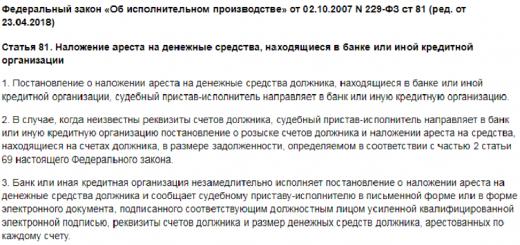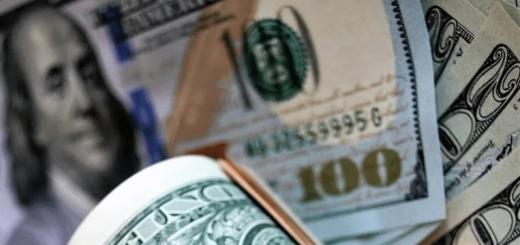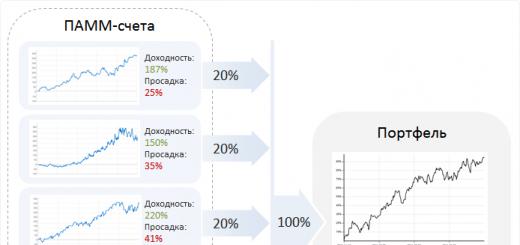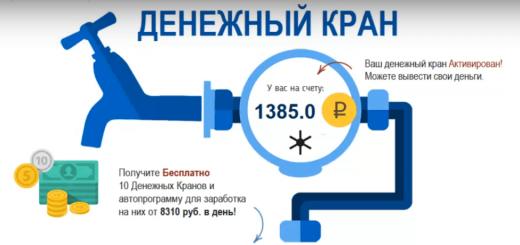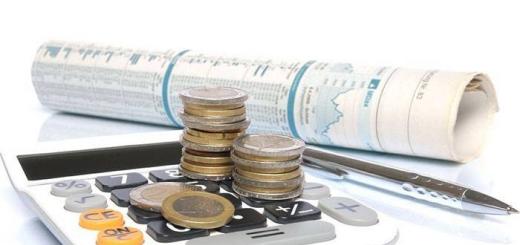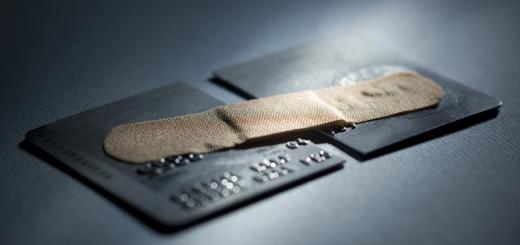Verbitsky
Georgy Verbitsky:
Andrey Movchan:Based on the story of the Discovery and conversations with friends.
My friends, especially those who are not from the world of finance - and I have quite a lot of them. I am writing to those who have savings in dollars/euros and who keep them in Russia. In banks, at a broker, or just at home under the mattress - it’s not so important.I want to tell you that the only reason to store them in Russian jurisdiction is the rate >5% in a state bank (one of my friends has this).
In other cases you:
a) you are exposed to country risk, which in Russia is historically quite strong - over the last century, savings were reset to zero twice on a large scale, and decreased under various pretexts countless times
b) you are not receiving a return that could be approximately 10%The correct way to store dollars and euros is an account with Interactive Brokers. This is a large and reliable American broker with a history of 30 years, traded on the stock exchange under the ticker IBKR.
The brokerage account DOES NOT NEED to be declared. And the coolest thing is that on this score You can implement strategies that conservatively allow you to earn about 10% per annum in the long term. Conservatively and without any active actions. You don't even need to be a trader - just open an account and buy 5-6 dividend tickers.
You can open an account electronically and remotely. There is even Russian-speaking support. In general, everything is so chocolatey that I simply don’t understand people of my generation who don’t use/know. If you have any questions, write, I’ll tell you how to do everything right. There is still a window of opportunity, but how long it will last is unknown.
Have a positive weekend everyone)
It’s interesting how people who are quite decent in life completely lose shame when it comes to financial markets. Well, why is it not customary in good society to recommend being treated with donkey urine or declaring that a bat’s ear brings good luck, but you can easily write that investments in 5-6 stocks with high (??) dividends over a long horizon - is this a conservative (!!) investment, and also gives 10% per annum in dollars? What is this - bad student syndrome ( I don't know that I don't know something), or availability bias (this happened to me in a couple of years and I think it will always be like this), or just an irresponsible statement? But where is at least some kind of reflection? Why, if this is how you can make 10% per annum at a loan rate of big jar at 2% per annum, the world's largest players haven't bought up all these shares yet?
People, remember. On " open market", where all information is equally accessible and used, the best result is the index minus a little. And indices can move not only up, but historically DJ is 6% per annum, and then, it seems to me, it will be less. And the historical volatility of stock portfolios is one and a half times higher than the profitability, so the one who accidentally received 10% per annum paid for it with drawdowns of 10 - 2*15 = 20% down at least. And if you're going into stock portfolios, if I were you expected 5% per annum with a volatility of 7.5%, that is, a drawdown of minus 10 - 17.5% , and this is if you are a cool player. These levels correspond to absolute income levels - experience shows that if you are cool, then your absolute (that is, not linked to indices) income will be subject to inflation + 3% , that is, today it is approximately the same 5% per annum, only the volatility will be much less.
Higher returns and lower volatility are either short-term luck, the use of very special equipment, or special market opportunities. And this is never conservative - do not listen to magicians, astrologers and charlatans.
Judging by the latest statistics, the decline Russian economy continues. True, the pace of this decline has slowed somewhat compared to last year. On whether we should expect a rapid economic recovery, what could serve as drivers GDP growth, and how long the crisis will last, the program director told us “ Economic policy» Carnegie Moscow Center Andrey Movchan.
|
— At the end of January, the decline in GDP in Russia slowed to 2.5% per year. At the end of 2015 it was 3.7%. What is behind these numbers: has the Russian economy begun to revive, or are these some kind of statistical tricks?
— In my opinion, there is nothing behind these figures, since it is generally impossible to keep track of monthly changes in GDP - this is a statistically unreliable value. Yes, and it will be recalculated many times and refined due to seasonal factors. Let's still look at the annual figures.
- Let's. According to all forecasts, the decline in Russia will continue this year. Only specific figures differ: the Ministry of Economic Development speaks of minus 0.8% at the end of 2016, the IMF says minus 1.5%, and the HSE consensus forecast is minus 1.5%. What's your forecast?
— Making forecasts is a thankless task, since GDP is made up of a large number of different manageable and not so manageable components. For example, if the state at some point orders 10 thousand new tanks, this will greatly increase GDP, but will not mean that the economy has strengthened. Therefore, whether we end up with minus 0.5%, minus 1.5% or minus 2.5% is difficult to say. This largely depends on whether the state will carry out unsecured emission - that is, print money in larger or smaller volumes without appropriate reserve or commodity backing. It also, of course, depends on the price of oil. It is more or less expected that our GDP will fall, and its quality will continue to deteriorate. Oil exports, consumption, and industry are declining. The country is in recession and no one denies it. We will calculate specific figures at the end of the year.
— How long will the current crisis in Russia last, and what can be considered the time of its end?
— And our crisis is already over. We had a crisis associated with falling oil prices, a fairly severe shock, and the economy was out of balance for some time. Now it has returned to a balanced state, although at a lower level. What you call a crisis is actually a structural recession. This is a unidirectional movement, not a temporary phenomenon. Our initially unviable economy was fueled in the early 2000s by “narcotic” oil money. And, slowly dying, she continued to exist thanks to this drug. Having lost it now, she experienced withdrawal, but this did not make her viable. In order for it to live, it must be greatly reformed.
— And yet, are there any prerequisites for the economic recession in the Russian Federation to give way to growth? How much can the government's anti-crisis plan, which was born in such agony, help this?
— The current anti-crisis plan does not look like a means of salvation. It looks, roughly speaking, like a bottle of beer in the morning after a wild party. The oil money that came into the country was not used properly and did not ensure the growth of the economy, which eventually became archaic and became ineffective. And now the entire anti-crisis project boils down, in essence, to the intention to pour a certain amount of money into the same old trough. Of course, if a drinker feels bad after a party, you can give him some beer to help him come to his senses. What to do with it next? There are no answers to this question. The latest government program, developed after the recent forum in Krasnoyarsk, very accurately describes our problems, but there is not a word in it about what exactly needs to be done to solve them. It seems to me that everyone is afraid to openly say out loud that our risks for economic development are too high. Here's the main problem. We need to make sure that investors want to invest and entrepreneurs want to do business. But risk reduction will not happen without a powerful structural restructuring of the entire state economic management system.
— Indeed, according to statistics, both external and domestic investment. Perhaps, in these conditions, the state will take on the role of the main investor?
 —
No state is simply physically capable of playing this role. It is impossible to effectively manage economic development using administrative methods. Moreover, our state cannot play this role. He doesn't have that much money yet. We have a budget deficit of around 3-5% of GDP, and the need to cut costs. Our state has already played enough with investments, convincingly proving that all of its financial investments have an efficiency equal to minus 100%. Look at the state of VEB, at the state of Rusnano, at GLONASS, which is now bashfully silent, at the Power of Siberia. The state should not be able to make investments. It must create conditions, and investments will come on their own. Russian citizens have more than a trillion dollars in European banks, which is comparable to the size of annual GDP. The state doesn’t even have close to that amount. And foreign investors have even more money. Russians hold approximately a quarter of a trillion dollars inside the country. Imagine that they would want, under appropriate conditions, to transfer them to real economy. They would invest in the construction of bakeries and small factories, and they would begin to produce, say, tubes for IVs and medical beds. Then this quarter of a trillion would be multiplied in the economy and would then be used to pay wages, for consumption, and so on. The state is not an investor; it must be a regulator, and a good one at that. In extreme cases, the state can become an assistant, a partial creditor, a guarantor - but not an initiator or a shareholder.
—
No state is simply physically capable of playing this role. It is impossible to effectively manage economic development using administrative methods. Moreover, our state cannot play this role. He doesn't have that much money yet. We have a budget deficit of around 3-5% of GDP, and the need to cut costs. Our state has already played enough with investments, convincingly proving that all of its financial investments have an efficiency equal to minus 100%. Look at the state of VEB, at the state of Rusnano, at GLONASS, which is now bashfully silent, at the Power of Siberia. The state should not be able to make investments. It must create conditions, and investments will come on their own. Russian citizens have more than a trillion dollars in European banks, which is comparable to the size of annual GDP. The state doesn’t even have close to that amount. And foreign investors have even more money. Russians hold approximately a quarter of a trillion dollars inside the country. Imagine that they would want, under appropriate conditions, to transfer them to real economy. They would invest in the construction of bakeries and small factories, and they would begin to produce, say, tubes for IVs and medical beds. Then this quarter of a trillion would be multiplied in the economy and would then be used to pay wages, for consumption, and so on. The state is not an investor; it must be a regulator, and a good one at that. In extreme cases, the state can become an assistant, a partial creditor, a guarantor - but not an initiator or a shareholder.
- We talk a lot about structural reforms - if Russia does not start them in the very near future, then it will inevitably fall into the category of third world countries. Your opinion?
— By all measures, we are already in this category - in the region of Vietnam, Thailand and the Dominican Republic. In terms of GDP per capita - somewhere in the eighth tenth country, in terms of average income of the population - in the ninth tenth, in terms of private sector GDP per person - somewhere in 115th - 116th place. We just continue to deceive ourselves with the fact that we have the 15th or 16th economy in the world in terms of GDP.
As for structural reforms, we must clearly understand that for some time they will only worsen the situation. They cannot, relatively speaking, give you a positive effect overnight. It's like renovating an apartment - the result may be wonderful, but your home will temporarily be in a dilapidated state. Now we have much less money and patience for reforms than ten years ago, when we had oil revenues. And then, according to global practice, the average time to return even to the pre-reform level is five to six years. Look at Poland - here is a canonical example of successful implementation of structural reforms. The country was in failure for five or six years, and then grew twice as fast as Russia. I’m afraid that the Russian authorities simply do not have the credibility to allow the situation to sharply deteriorate over such a period of time. She constantly convinces the population that she has achieved stability, that the current recession is slow, calm, without shocks, without fundamental changes, with care for the large dependent sector, which is already accustomed to simply receiving money from the state. This is precisely why our government is loved. If they suddenly say at the top that now we will break everything here, raise taxes, that you will have minus 15% of GDP, that you will have to look for a job, I’m afraid there will be no trace left of the current government rating. But if we do go for it, then in six to eight years we will see the results of the reforms. At least the path to growth will be cleared. Russia has great potential on which to build a good economy.
— But in any case, it is necessary to move away from the raw materials model of the economy. We can’t sit on the “oil needle” forever, can we?
— It's not obvious. Even today we have a positive trade balance. And although GDP per capita in Russia is only 8 thousand dollars a year, and in 2017 it could be 7.6 thousand dollars, and then 6 thousand, any fall has a natural limit. Unless some catastrophe occurs (which is quite possible), at some point the situation will stabilize, and the economy will continue to exist in an archaic and inefficient form. People will still eat, go to the hairdresser, and ride something - albeit on a trolleybus, and not in a car. For the Russian economy, 5.5-6 thousand dollars per person is a fairly equilibrium level. Thank God, we still have market pricing, the market value of the ruble, and they are adapting the economy.
The raw material model itself, if you manage to avoid cataclysms such as collapse banking system, infrastructure or clashes of elites, a fairly stable future, with it we can easily live for another 50-70 years. It is possible that we will have new types of resource income. For example, goods will begin to be transported through us from China to Europe and back. We will be able to collect transit money, like our ancestors in the 13th-9th centuries. Or use the territory of Siberia for the disposal of nuclear and other waste. And, having gradually created a three- to five-factor model of purely state socialized income, we can remain in this state for a very long time. It will be poverty, but stable poverty.
— Are there still any drivers for economic growth in Russia? Can import substitution and the defense industry play this role, or can we only hope for a spontaneous rise in oil prices?
— Structural reforms are painful, but the only truly serious driver. A driver is an attractive investment. The defense industry will not save you - it is not attractive for animation, the state invests in it centrally. We now sell $10 billion worth of weapons a year—a trifle compared to our two hundred and fifty billion dollar exports. If we, suppose, start selling for 20 billion, nothing will change: we need a different scale. For example, the volume of trade between China and South Korea is $300 billion per year.
The same goes for Agriculture. Its share in GDP is only 3%. We don't have some magical business that will make us rich. For a country like ours, we need conditions for dozens, maybe hundreds of different types of businesses that will develop. Then we can talk about stable economic growth.
Financier and director of the Economic Policy program at the Carnegie Moscow Center, Andrei Movchan, spoke to Anews.com about how economics is connected to politics, how Russian society is “adapting to a dead end,” and why Russia may be about to miss its chance to be in the “first league.” » economically developed countries.Facebook / Andrey Movchan
That is, there will be no steps towards innovation economy, which Dmitry Medvedev loved to talk about when he was president?
There will be no steps for many reasons. I named only one. The second is that the Russian power vertical is built on a deal between the authorities and the country’s governance pyramid, the essence of which is, if you like, the slogan “loyalty in exchange for rights.” Members of the “vertical” receive the right to disregard the laws and rights of people who are not part of the vertical and who are lower in the vertical, and the interests of society. If we start taking away these rights now, the loyalty of governors, mayors, officials, and security forces will instantly disappear. And this is very dangerous for the authorities, because if these officials do not have incentives to support the central government, then we will very quickly get classic feudal fragmentation. Or even a new government that can confirm the old contract.
There will be no reforms also because there is no order from the population. For him, reforms are the “dashing 90s”, bandits, poverty, unemployment, the decline of all economic indicators. Explain that the situation in the 90s is a consequence of the collapse of the USSR, which was predetermined by the very essence of the socialist system, that the reforms of the 90s not only saved the country from civil war, but also 20 years later in 2014-16, it was thanks to them that Russia survived the oil shock and stood - it’s useless, no one listens. Another reason is that no one here knows how to carry out reforms. Who should do them - hire “Varangians” from abroad? Russians are afraid of foreigners, just like in the days before Ivan the Terrible, we have our own way again. Where can you find people who have the relevant knowledge and work experience? If you don’t invite Baltserovich, you’ll definitely be accused of trying to sell Russia to America!<...>
- What is the historical role of Russia, if it exists at all?
I doubt that the concept of "historical role" makes any sense at all. Any country modern world There can be only one positive role - to provide its citizens with a high and constantly growing standard of living, comfort and security, and, if possible, to cooperate mutually beneficially with other countries. In my opinion, Russia has missed its historic chance to become one of the world leaders in the quality of life of its citizens. A chance that really existed after the 1991 revolution and still remained in the early 2000s. Now the country is heading towards a dead end, and society is quickly adapting to this dead end, not just agreeing with it, but also starting to block any objections. We are driving ourselves into a trap of lies - the idea of refusing material progress due to our supposed moral superiority over the West is becoming increasingly popular. But in practice, in terms of crime rates, the number of abortions and divorces, drug addicts and alcoholics, family violence and child mortality, we are orders of magnitude ahead of the West, but in terms of book circulation and the volume of charity, we are radically behind.
Another 10-15 years, and the chance to bring Russia, within its current borders and with the current structure of society, to the “major league” will be lost forever. Perhaps there will be no country called “Russia” in this place by the end of the 21st century, but something else.
This information contains general information only. However, neither Movchan’s Group, nor its member legal entities, nor their affiliates are providing any advice or services of a professional nature through this message. None of legal entities, members of the Movchan’s Group, is not responsible for any losses incurred by any person using this message. This information is not an offer defined in accordance with the laws of the named jurisdictions, and does not serve as the basis for concluding an agreement. The exact list of services and their cost is subject to clarification from Movchan’s Group employees.
"The information presented on this website is not an investment consulting activity, is not individual investment advice, and is not the provision of advisory services in relation to valuable papers, transactions with them and (or) concluding contracts that are derivative financial instruments, by providing individual investment recommendations in the sense of Article 6.1. Federal Law dated April 22, 1996 No. 39-FZ "On the securities market." The financial instruments mentioned and possible services described on this website do not constitute individual investment advice and may not be suitable for the relevant client based on his or her investment profile. This information does not constitute an offer to enter into an investment transaction or an individual investment advisory transaction and is for informational purposes only. The posting of this information on the site does not create any obligations either for Movchan’s Group (including the group companies individually) or for the user (reader of the information). The information provided on this site may not be accurate or current at the time you read it. Past fund management performance does not guarantee future performance.
None of the Movchans Group companies engage in individual investment consulting within the meaning of Article 6.1. Federal Law of April 22, 1996 No. 39-FZ “On the Securities Market”. Any information posted on this website cannot be considered as individual investment advice within the meaning of Article 6.1. Federal Law of April 22, 1996 No. 39-FZ “On the Securities Market.”
